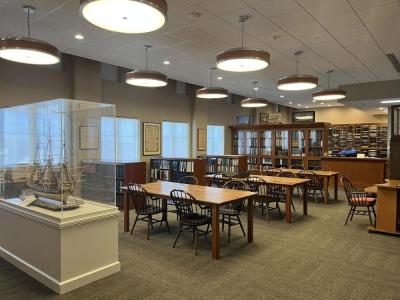UMass Dartmouth professor uncovers Underground Railroad’s maritime history on South Coast
Timothy Walker grew up in Ohio, where he received a “very conventional understanding of the Underground Railroad” as a network that was organized over land.
In 2009, Walker, a professor of history at UMass Dartmouth, worked on the Schooner Ernestina-Morrissey and learned the story of New Bedford as a stop on the Underground Railroad.
He and the president of the New Bedford Historical Society, Lee Blake, later received funding to bring in teachers from around the country and the South Coast to educate them on New Bedford’s connection to the Railroad.
In organizing those lessons, Walker learned more and more about the scale of maritime slave escapes.
“It became clearer and clearer that this story is important to tell, and it’s something people don’t think about when they think about the Underground Railroad,” Walker said.
Walker will tell that story on July 22 to the Descendants of Whaling Masters, a New Bedford-based group of South Coast residents interested in their ties to whaling history. Seven Dartmouth residents are members of the Masters. The event is open to the public and will take place at Wamsutta Club, 427 County Street, New Bedford, Massachusetts, from noon to 3 p.m.
The story is also told in the 2021 book “Sailing to Freedom,” which Walker edited and nine other historians contributed to.
“I am really excited about speaking with the Descendants of Whaling Masters,” Walker said. “Their ancestors are just deeply involved in the stories. I hope that the audience gathered will be inspired by [the work].”
Almost all of the successful escapes documented along the Underground Railroad originated very close to the border to free states, Walker said. By contrast, almost all of the documented escapes from the far south occurred via water.
Walker said the reality has been ignored to a degree by existing scholarly writing on the subject, which he partially chalks up to maritime history falling out of fashion. Also, it’s somewhat difficult to know a lot of the “fine grain detail” about the Underground Railroad because of its clandestine nature, he said. In other words, people didn’t always want to write down the details of their illegal activities.
“No one had pulled together this story of the Underground Railroad,” Walker said. “This has just never really been thoroughly described.”
Walker and his colleagues’ research uses a variety of methods to uncover how slaves were transported to freedom by boat. One of the primary bodies of documentation is slave narratives, which are personal stories told by former slaves that could write. Walker said there are a little over 100 slave narratives in the United States, and about 70 percent of them mention an escape over water.
“The goal for me has always been to change the way we conceptualize the Underground Railroad,” Walker said. “Slowly, I think that story is working its way into the curriculum.”
While his keynote speech to the Descendants of Whaling Masters will primarily be about the underground railroad, Walker also plans to touch on his recent effort to use 19th century whaling logs to provide a deeper understanding of climate change over the course of the last two centuries.
Walker’s climate change project also arose out of his time on the Ernestina-Morrissey, when he discovered just how many whaling logs the New Bedford Whaling Museum had in their archives.
Whaling logbooks in particular are key pieces of the puzzle in mapping out weather patterns of the 19th century, as whalers went to parts of the ocean that no other ships did. Most of the logbooks also come from just after the industrial revolution, providing a perfect starting point for studying carbon’s effect on the atmosphere.
Walker is partnering with the Woods Hole Oceanographic Institute on the project. They examined about 100 logbooks as a “proof of concept” for the idea. At the time of his interview with Dartmouth Week, Walker was in Portugal to expand the reach of his climate change work to Portuguese vessels.
In 2022, Walker and his colleagues’ research on the Underground Railroad was put on display in the New Bedford Whaling Museum. The success of that exhibition means it’s now traveling to museums up and down the coast, and will next be in Charleston, South Carolina.














